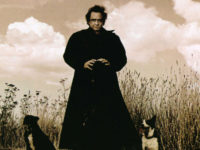The legend and lore of an old-timey string band on steroids grew with every hell-raising early show performed by Old Crow Medicine Show. They were like an old-fashioned tent revival gone mad.
The band continued evolving, from the moment folk-country legend Doc Watson’s daughter discovered them busking in front of Boone Drug Store in the Appalachian Mountains to a canny update of a Bob Dylan scrap that became the ageless “Wagon Wheel” through to 2022’s Paint This Town – which left Ketch Secor as the last remaining co-founding member. Thankfully, Old Crow Medicine Show never drifted far from their unique blend of a century of American music along the way.
Their fifth album, 2006’s Big Iron World, brought the group into the country Top 40 for the first time, and Old Crow Medicine Show decided to leave the familiar confines of Music Row to craft their most venturesome project yet. Tennessee Pusher would become Secor’s dream realized: a forewarning haunting tale of heartache, murder, drug abuse and redemption.
Recorded in Los Angeles with legendary producer Don Was, Tennessee Pusher confirmed Old Crow Medicine Show’s arrival as their first-ever country Top 10 smash in 2008.
Like their latest LP, the lineup would be without Critter Fuqua, who’d reportedly grown weary of life on the road. His superb songwriting was evident on albums such as O.C.M.S. and Big Iron World, and would certainly be missed. But longtime friend of the band and New Orleans native Gil Landry stepped in to help produce Old Crow Medicine Show’s most critically acclaimed project to date.
Tennessee Pusher opened up with “Alabama High Test,” a tale of modern-day moonshiners trafficking “Dixie-fried homegrown” down Interstate 65: “Alabama high-test, got me in a big mess. Higher then a wildcat running from the wolf pack. They’re gonna put me in the slammer if they catch me with that Alabama High Test.” A real crowd pleaser at live shows, “Alabama High Test” was the kind of track that kicks you in the face with a hobnail boot and demands your attention.
From there, Old Crow Medicine Show introduced its first-ever track with drums in Ketch Secor’s easy-riding love tale “Highway Halo.” Willie Watson’s seven-minute narration of heartache follows in “The Greatest Hustler of All”: “The greatest hustler of all stands about four-foot nine. Made to be a moocher, low-down hoochie coocher, her daddy made her walk the line.”
The tales continued with “Methamphetamine,” Secor’s eerie warning about the pains and tragedy of drug abuse: “Well, it’s a war out there, and it’s fought by poor white men from the Plateau to the falls of the Cumberland. You better watch your back, ’cause you just can’t trust a friend.” The song clearly highlights the horror of addiction, yet usually drew howls of support from patrons at live shows – perhaps further illuminating the point Old Crow Medicine Show was trying to get across in the first place.
Sprinkled in throughout Tennessee Pusher were the classic country ballads of melancholy “Next Go Round,” “That Evening Sun” and “Lift Him Up,” all paired with Willie Watson’s classic folk voice. “Mary’s Kitchen” was Gil Landry’s comical description of a Memphis brothel that’s swinging enough to raise a corpse out of its seat for a shake down: “She got a sign on her front porch saying ‘Hot Stuff For Sale’ in a little three-room shotgun in the alley behind the jail.”
The album ended with Ketch Secor’s pride and joy, “Caroline.” He’d tried to get this song recorded for years, but never found the right sound – until now: “Oh Caroline, heartbroken hard times, they never got us down. Walkin’ the same line through every shady southern town, hand-in-hand, your arm ’round mine, oh Caroline we’ll be just fine.” While most of the experiences from Tennessee Pusher are filled with sadness and remorse, “Caroline” sent you back into the world with a renewed sense of hope.
- How ‘Tennessee Pusher’ Defined Old Crow Medicine Show’s Constant Evolution - March 22, 2023
- Why R.E.M.’s ‘Part Lies, Part Heart, Part Truth, Part Garbage’ Remains Definitive - November 11, 2021
- Simon and Garfunkel Set a High Bar While Saying Goodbye on ‘Bridge Over Troubled Water’ - January 15, 2020




